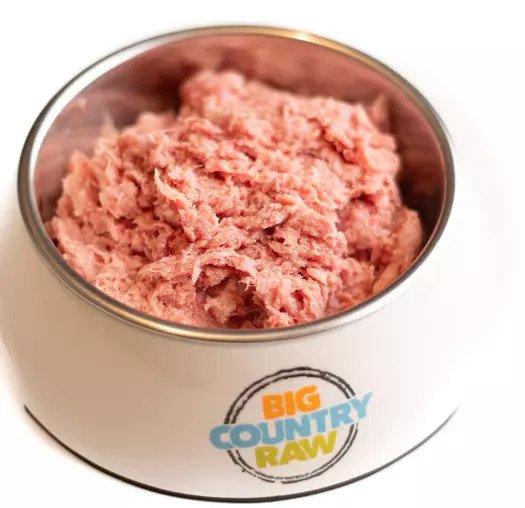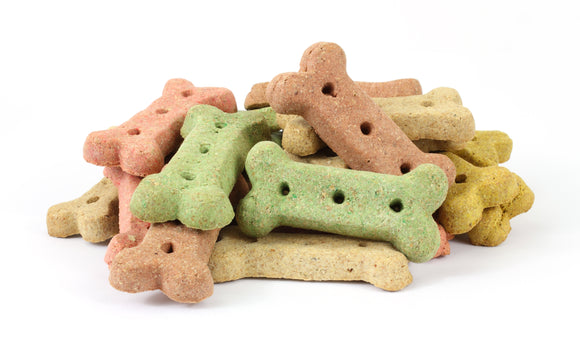
HOW TO CHOOSE DOG FOOD - An In-depth Guide on Dog Nutrition (Part 1)
Table of Contents

The most common question dog owners ask after adopting a dog is what is the basic nutritional requirement of my dog? Basically, dogs need an adequate amount of a well-balanced diet to maintain their overall physical and mental health.
If you want to know what are the best foods for your dog. You must first understand the nutritional requirements of your dog. In this article, we will analyze what are the nutrients your dog needs and what you should look for when choosing a dog food.
What Are The Dietary Needs of Dogs?
As you know, dogs are carnivores, but does this mean that they need meat in their diet? Basically, dogs are members of the carnivorous order, and the dietary requirements of this order are different. Some of the members that belong to this group have a permanent requirement for meat in their diet; these members are called obligate carnivores or true carnivores.
Some of the members of this group satisfy their dietary needs by eating meat and plants or a combination of them. These members are called omnivores. The common example of this group is the dog and the human.

The intestinal structure of dogs is designed in such a way that it will adapt to the omnivorous diet. This indicates that under normal conditions, the nutritional requirement of the dog can be met by animal and plant sources. The quality and source of nutrients are very important for the digestibility of the nutritional component of dog food.
Your dog can grow well on a vegetarian diet and a meat diet, but if you only give him the whole meat diet, it will not meet his nutritional requirements, and his food remains unbalanced.
Dog Nutritional Requirements
The nutritional needs of a dog are different for different stages of life. Most people feed their dogs a diet formulated for all stages of life. This all-stage food will provide most of the nutrients for your dog, but if you feed them according to their life stage, it will meet all of their nutrient requirements.
That's why veterinary nutritionist suggests feeding according to different stages of life. Your puppy, adult dogs, pregnant females, and senior dogs require different nutrients according to their life stages. The information about nutrition, according to different stages, can be found on the dog food label.
The nutrient profile for dog divided into two types
- Nutrients for growth and reproduction
- Nutrients for maintenance
Growth and Reproduction
According to the American Association of Food Control Officials, lactating dogs, pregnant females, and puppies have different nutritional requirements compared to adult dogs.
Maintenance of Adult Dog
An adult dog has different nutritional requirements and requires nutrients to maintain its body structure and function. Dogs older than one year are considered adults. This nutrient variation can be seen in the dog's food packaging label.
Basic Nutritional Requirements for Dogs
Six basic nutrients are essential for dogs in their regular diet. These nutrients are water, proteins, carbohydrates, fats, vitamins, and minerals. These basic nutrients are present in all types of dog food and are essential for the basic functions of the body.
There is a minimum and maximum requirement of each nutrient, some of the nutrients if ingested in excessive amounts can cause toxicity. However, if the nutrients are administered in less quantity, certain deficiencies can occur.
The nutritional requirements for dogs have been established by the American Association of Food Control Officials (AAFCO). All commercial pet food companies follow the basic guideline given by (AAFCO).
When purchasing dog food, make sure it meets the AAFCO requirements. Guidelines established by AAFCO ensure your dog gets all the nutrients. If your dog suffers from a health problem, you can contact your veterinarian for any modification in the diet.

Water
The amount of water a dog needs on a daily basis depends on several factors. Water is an essential nutrient, and, like humans, their body is also made of 80% water. The factors on which the water requirement depends are
Size
A healthy dog requires about 1/2 to 1 ounce of water per pound of body weight per day.
Age
A puppy needs about ½ cup of water every two to three hours.
Adult or Senior dog needs one ounce of water per pound of body weight per day.
Food
Dogs that eat dry food drink more water compared to those that eat canned or wet food.
Weather
Dogs drink more water in the summer season compared to winter.

Proteins and Amino Acids
Protein is a necessary part of the dog's diet, and the dog cannot survive without this basic nutrient. Dietary protein can provide dogs with 10 specific amino acids that dogs typically cannot produce on their own. These amino acids that dogs cannot produce on their own are known as essential amino acids.
Amino acids are biologically active compounds that provide the building blocks for proteins. Furthermore, these amino acids can donate carbon chains, and these carbon chains are necessary to produce glucose for energy.
Always feed your dog with high-quality dog foods because they contain all the necessary amino acids. Much research shows that if your dog's food is missing just one amino acid, your dog will not eat and will avoid that type of food.
Dogs are picky when it comes to choosing foods rich in protein. The biological requirements for essential amino acids are not known due to the complex response of the body.
The ten amino acids required in dog food are Histidine, Leucine, Arginine, Methionine, Isoleucine, Threonine, Tryptophan, Lysine, Phenylalanine, and Valine.
According to AAFCO, the minimum amount of protein required for the maintenance of an adult is 18%. Similarly, the minimum amount of protein required for reproduction and growth is 22.5%.
Fats
Fats are the most concentrated source of energy. The fats are obtained mainly from the seeds of various plants and from animal fat.
Fatty acids obtained from food sources are essential fatty acids and cannot be synthesized by the body. These essential fatty acids also act as carriers for important fat-soluble vitamins.
Fatty acids play an important role in maintaining the health of the dog. They play an important role in maintaining cell structure and function. Fats in food increase the taste and texture of dog food. This essential fatty acid also helps keep your dog's skin and coat healthy.
If your dog's food is devoid of fat or fats are present in low amounts, your puppy will suffer from skin lesions, and thick, dry hair, and your puppy will be more prone to infections.
The essential fatty acids that a dog requires in his diet are omega 3 and omega 6 fatty acids. The deficiency of omega 3 fatty acids can affect learning ability and vision problems. Similarly, omega 6 fatty acid deficiency can also lead to the disruption of many important physiological functions.
According to AAFCO, the minimum amount of total fat recommended in dog food is 8.5% for reproduction and growth. The minimum amount of fat necessary for the maintenance of an adult is 5.5%.

Dog Energy Needs
Every living creature needs the energy to maintain the basic activities of daily life. Exercise, growth, pregnancy, and lactation - all of these activities increase the body's energy requirement. Energy is derived from three main components: protein, fat, and carbohydrates. Energy is generally measured in terms of calories.
Dogs also get some of their energy from carbohydrates, which include starches, sugars, and dietary fibers. Although they are not essential, they provide the energy necessary to maintain bodily functions.
The carbohydrates that are present in dog food are obtained from legumes, cereals, and other foods. Some of the carbohydrates, like fructose and glucose, are absorbable carbohydrates that do not need any enzymes for digestion.
Similarly, fermentable carbohydrates include some dietary fibers and starches and pass through the small intestine to the colon without being digested. In the colon, these dietary fibers and starches are fermented by microbes into gases and short-chain fatty acids.
Many research studies suggest that these fermentable fibers help improve immune function and maintain blood glucose concentration.
Similarly, non-fermentable fibers such as wheat bran and cellulose provide less energy but are used to decrease the caloric intake of obese animals. According to AAFCO, the caloric requirement of dog food is 4000 kcal ME / kg of dry matter.
Vitamins
Vitamins are essential organic compounds that can maintain a wide range of metabolic activities. Vitamins are required in dog food in a very low amount. It was first noticed about 75 years ago that deficiency of vitamins can cause many health problems.
The most important vitamins that the human body need are:
- Vitamin A
- Vitamin B family
- Vitamin D
- Vitamin C
- Vitamin E
- Vitamin K
- Choline
It is important to understand that dogs need these vitamins but in a different amount than humans.
Vitamin A
Naturally, vitamin A is present in carrots and is responsible for maintaining good eye vision. Vitamin A is a fat-soluble vitamin and is responsible for fetal development, body growth, cell function, and immune function.
According to AAFCO, the minimum requirement for vitamin A for growth and reproduction is 5000 IU / kg, and the minimum requirement for adult maintenance is 5000 IU / kg on a dry matter basis.
Vitamins B
Vitamin B is a group of vitamins, and they play a vital role in the health of your dog.
Vitamin B1, also known as thiamine, is responsible for carbohydrate and energy metabolism and also activates ion channels in neural tissues. Vitamin B1 is found naturally in cereals, beans, yeast, and nuts. According to AAFCO, the minimum vitamin B1 requirement for growth and reproduction is 2.25 mg/kg, and the maintenance requirement of an adult dog is also 2.25 mg/kg on a dry matter basis.
Vitamin B2, also known as riboflavin, combines with niacin and helps facilitate enzyme function. The minimum requirement of vitamin B2 for growth, reproduction, and adult dog maintenance is 5.2 mg/kg on a dry matter basis.
Vitamin B6 is a water-soluble vitamin and also known as pyridoxine. Vitamin B6 plays a vital role in glucose generation, red blood cell and nervous system function, immune response, hormonal regulation, gene activation, and niacin synthesis. According to AAFCO, the minimum requirement for growth and reproduction is 1.5 mg/kg, and for the adult, maintenance is 1.5 mg/kg on a dry matter basis.
Vitamin B5, also known as pantothenic acid, is a water-soluble vitamin. It helps in energy metabolism and the formation of coenzyme A. The minimum requirement of vitamin B5, according to AAFCO, is 12 mg/kg for growth and reproduction and 12 mg/kg for adult maintenance on a dry matter basis.
Vitamin B9, also known as folic acid, plays an important role in nucleotide and amino acid metabolism and in mitochondrial protein synthesis. According to the AAFCO, the minimum requirement of folic acid is 0.216 mg/kg for growth and reproduction and 0.216 mg/kg for adult maintenance.
Vitamin C
Dogs can produce the vitamin C they need for normal metabolism from glucose, but that amount does not meet the demand for optimal health. Vitamin C acts as an antioxidant and can remove free radicals from the body and also help reduce inflammation. Vitamin C is not listed as a required nutrient in AAFCO published canine profiles. The optimal level of supplementation and addition of Vitamin C in dog food is considered safe.
Vitamin D
Vitamin D is famous as a sunshine vitamin and is one of the essential nutrients that help dogs maintain calcium and phosphorus balance for healthy bone growth. An adequate level of vitamins is necessary to maintain healthy muscles and bones. The minimum requirement of vitamin D for growth and reproduction is 500 IU / kg, and for the adult, maintenance is 500 IU / kg on a dry matter basis.
Vitamin E
Vitamin E is a fat-soluble vitamin necessary for young dogs to grow properly. Vitamin E plays an important role in defense against oxidative damage and also for fat metabolism and cell function. If the dog is on a diet deficient in vitamin E for a long time, they will suffer reproductive problems and muscle degeneration. The minimum requirement of vitamin E is 50 IU / kg on a dry matter basis for growth, reproduction, and adult maintenance.
Vitamin K
Vitamin K is a vital fat-soluble vitamin that helps in blood clotting and prevents bleeding problems. If dogs ingest any type of poison, their ability to use vitamin K in their bodies decreases and, if not treated in time, will lead to bleeding and death.
Choline
Choline is an essential nutrient for dogs and is an essential component of the phospholipid cell membrane. Choline helps in the important function of the brain and liver. Choline is also used in the treatment of epilepsy in dogs. The minimum requirement of choline for growth, reproduction, and maintenance of an adult is 1360 mg/kg on a dry matter basis.
Minerals
Minerals are divided into two basic groups of macro minerals and micro minerals. The minerals that are required in greater quantity are called macro minerals. Microminerals are required in minimal quantities.
The macro minerals necessary for dogs are phosphorus, calcium, sodium, magnesium, potassium, chloride, and sulfur. The microminerals needed by the body are copper, zinc, iodine, chromium, manganese, selenium, and fluorine.
Minerals are necessary to perform different functions in the dog's body. They are used to transmit nerve impulses and to strengthen bones. Some of the minerals are used in the formation of hormones and in maintaining a normal heart rate.
There is a strong interaction present between many minerals; therefore, minerals are fed in balanced amounts to provide optimal health. When you feed one mineral in too much quantity and another in small quantity, it will cause problems in the body.
The problems that occur due to minerals are because of excess imbalance of the interaction of minerals with other nutrients. That is why it is advisable to supplement your dog's food with the expert advice of your veterinarian. The health problem that occurs due to an improper balance of minerals is very serious.
When dog food is analyzed for energy, all nutrients except minerals are removed from the food. The material that remains is known as ash. This term is the most misunderstood in dog food and is often confused by people. A high-quality dog food contains 5% -8% ash.
Calcium and Phosphorus
Calcium is an essential mineral in the dog's diet, and phosphorus is the next important mineral in dog food. Phosphorus and calcium are the building blocks of teeth and bones.
Calcium also acts as an important messenger in the body and performs the following functions.
- Nerve impulse transmission
- Constriction and dilation of blood vessels
- Muscle contractions
- Blood coagulation
- Secretion of hormones
- A co-factor for enzymes
Calcium also plays an important role, such as keeping the heart rate stable and also keeping the calcium level in the blood constant. This is the reason why even if food is deficient in calcium, it will not be reflected in the blood.
Also, extra calcium is released from the bones if the calcium level drops below the recommended level to keep vital organs functioning.
According to AAFCO, the minimum requirement of calcium and phosphorus for growth and reproduction is 1.2% and 1.0%, and for adult maintenance, it is 0.5% and 0.4% on a dry matter basis.
Sodium, Potassium, and Chloride
The main electrolytes present in body water are potassium, sodium, and chloride. Electrolytes are basically minerals and are naturally present in the body as electrically charged ions and particles. Electrolytes are also essential to keep your fluid balance at a normal level.
Function of electrolytes
- Maintaining osmotic balance
- Maintaining acid-base balance
- Transmitting muscle contractions
- Transmitting nerve impulses
Magnesium
Magnesium is a mineral that controls the following function in your dog body.
- It is the main component of enzymes, bones, and intracellular fluids.
- Magnesium has a large effect on neuromuscular transmission.
The minimum requirement of magnesium for reproduction and growth is 0.06% on the dry matter (DM) basis and adult dog need same amount for maintenance.
Iron
Iron is an important nutrient that is essential for the dog's body. It has several benefits, but the main function is the movement and transport of oxygen in the body. This function is performed mainly by myoglobin (pigment in the blood that carries oxygen) and hemoglobin (pigment in the muscles that carry oxygen), and iron is an essential part of these pigments.
Iron is also an important component of various enzymes, such as cytochromes. These enzymes have an important role in energy metabolism. Iron plays an important role in strengthening the immune system. Important sources of iron include fish, red meat, eggs, poultry, and legumes.
The minimum requirement of iron for reproduction and growth in dogs is 88 mg/kg and 40 mg/kg for adult maintenance on a dry matter basis.
Zinc
Zinc plays a very important role in the dog's body because it acts as an activator or constituent of enzymes, hormones, and proteins for different bodily functions. More than 200 enzymes require zinc for their activation and production.
The main function of zinc is wound healing, growth, reproduction, support for healthy hair and skin, strengthening the immune system, digesting protein, and regulating thyroid function. If dog food is deficient in zinc, it can lead to a lack of immunity against infections.
Food sources that can provide a good amount of zinc are pork, eggs, liver, lamb meat, and brewer's yeast. The zinc requirement for reproduction and growth in dogs is 100 mg/kg, and adults need at least 80 mg/kg for maintenance on a dry matter basis.
Copper
Copper plays a key role in various body functions and biological processes of the dog, including neurotransmitter synthesis, collagen formation, connective tissue and bones, antioxidant defense, iron absorption and metabolism, mitochondrial respiration, pigmentation of the skin and hair, the maturation and development of red blood cells.
Copper is an important micronutrient that keeps blood vessels, immune system, nerves, and bones healthy. It is usually found in fish, whole grains, liver, and legumes. Copper supplementation is generally not necessary as commercial dog foods contain the required amount of copper.
The minimum amount necessary for growth and reproduction in a dog is 12.4 mg/kg, and the maintenance requirement for an adult dog is 7.3 mg/kg on a dry matter basis.
Selenium
Selenium is an essential trace mineral in dogs. It has many health benefits, so it should be included in dog food. Selenium is generally available in two forms, one is selenium yeast, and the other is sodium selenite. Selenium yeast is generally used in commercial dog food, as it is safe and more bioavailable.
The main functions of selenium are the metabolism of thyroid hormones and antioxidant protection. It also stimulates immune function when combined with vitamin E. Selenium is found primarily in meats, vegetables, brown rice, and seafood.
The minimum requirement for selenium for reproduction and growth is 0.35 mg/kg on a dry matter basis, and the maintenance requirement for an adult dog is also the same.
Final Words on Dog Food Selection
When selecting commercial dog food for your pooch, always look for the requirements outlined by AAFCO so your pet will get all the nutrients necessary for a healthy life.
Reference:
- https://www.aafco.org/Portals/0/SiteContent/Regulatory/Committees/Pet-Food/Reports/Pet_Food_Report_2013_Midyear-Proposed_Revisions_to_AAFCO_Nutrient_Profiles.pdf
- https://vcahospitals.com/know-your-pet/nutrition-general-feeding-guidelines-for-dogs
- https://www.akc.org/expert-advice/nutrition/
- https://www.nap.edu/resource/10668/dog_nutrition_final_fix.pdf
- https://www.hillspet.com/pet-care/nutrition-feeding/vitamins
- https://www.nomnomnow.com/blog/vitamins-and-minerals-required-in-dog-nutrition



